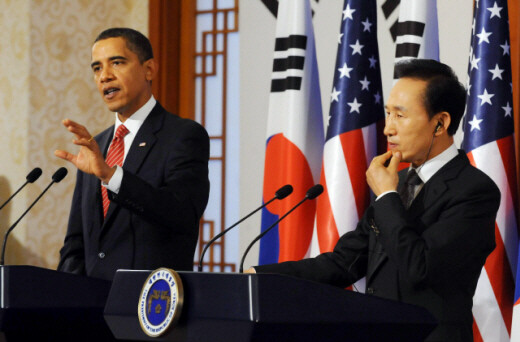hankyoreh
Links to other country sites 다른 나라 사이트 링크
U.S. receives criticism for contrasting Korea-Japan policies

The Barack Obama administration’s contrasting attitudes regarding moving the Marine Corps Air Station Futenma in Japan and the transfer of wartime operational control (OPCON) in South Korea have become a source of controversy. This is because the United States has shaken off requests by Japan’s Democratic Party government to renegotiate the deal to move Futenma outside Okinawa prefecture, with Washington basing its rejection on a deal worked out with the previous Japanese government led by the Liberal Democratic Party. Meanwhile, the United States has reportedly agreed to discuss delaying the transfer of wartime operational control to South Korea when President Obama meets with President Lee Myung-bak in Toronto on Saturday, leaving behind an agreement made with the Roh Moo-hyun administration.
The United States ignored a request to renegotiate by the former Democratic Party government of Hatoyama Yukio, who pledged in last August’s general election that he would move Marine Corps Air Station Futenma to, at the very least, a location outside of Okinawa. The United States pressured Tokyo to carry out an agreement made in May 2006 to move Futenma to Camp Schwab in Henoko, a coastal location near the city of Naho in northeast Okinawa, and the Democratic Party government was forced to “surrender.” As a result, the Social Democratic Party left the coalition government and the Hatoyama cabinet collapsed.
In response to “double moves” regarding major pending security issues in South Korea and Japan, the Center for Peace and Disarmament of the People’s Solidarity for Participatory Democracy (PSPD) released a critical editorial Thursday saying it could not help but be suspicious of the policy consistency and credibility of the Obama administration. PSPD also sent an official letter to the U.S. embassy in South Korea asking that it reveal the U.S. government’s official direction on the issue.
A former high-ranking official said Friday that the United States absolutely needs the original plan for the Futenma move to be executed, but it is likely willing to delay the wartime operational command transfer in South Korea because Washington has made the determination that a short delay would not harm the overall transfer, and that it can receive a number of concessions from South Korea in return. The official also said that in either case, U.S. policy consistency and credibility would necessarily take a hit.
Please direct questions or comments to [englishhani@hani.co.kr]
Editorial・opinion
![[Column] Has Korea, too, crossed the Rubicon on China? [Column] Has Korea, too, crossed the Rubicon on China?](https://flexible.img.hani.co.kr/flexible/normal/500/300/imgdb/original/2024/0419/9317135153409185.jpg) [Column] Has Korea, too, crossed the Rubicon on China?
[Column] Has Korea, too, crossed the Rubicon on China?![[Correspondent’s column] In Japan’s alliance with US, echoes of its past alliances with UK [Correspondent’s column] In Japan’s alliance with US, echoes of its past alliances with UK](https://flexible.img.hani.co.kr/flexible/normal/500/300/imgdb/original/2024/0419/2317135166563519.jpg) [Correspondent’s column] In Japan’s alliance with US, echoes of its past alliances with UK
[Correspondent’s column] In Japan’s alliance with US, echoes of its past alliances with UK- [Editorial] Does Yoon think the Korean public is wrong?
- [Editorial] As it bolsters its alliance with US, Japan must be accountable for past
- [Guest essay] Amending the Constitution is Yoon’s key to leaving office in public’s good graces
- [Editorial] 10 years on, lessons of Sewol tragedy must never be forgotten
- [Column] A death blow to Korea’s prosecutor politics
- [Correspondent’s column] The US and the end of Japanese pacifism
- [Guest essay] How Korea turned its trainee doctors into monsters
- [Guest essay] As someone who helped forge Seoul-Moscow ties, their status today troubles me
Most viewed articles
- 1[Column] The clock is ticking for Korea’s first lady
- 2After 2 months of delayed, denied medical care, Koreans worry worst may be yet to come
- 3Hong Se-hwa, voice for tolerance whose memoir of exile touched a chord, dies at 76
- 4Samsung barricades office as unionized workers strike for better conditions
- 5[Column] Has Korea, too, crossed the Rubicon on China?
- 6US overtakes China as Korea’s top export market, prompting trade sanction jitters
- 7[Editorial] As it bolsters its alliance with US, Japan must be accountable for past
- 8[Correspondent’s column] In Japan’s alliance with US, echoes of its past alliances with UK
- 9All eyes on Xiaomi after it pulls off EV that Apple couldn’t
- 10[Guest essay] How Korea turned its trainee doctors into monsters